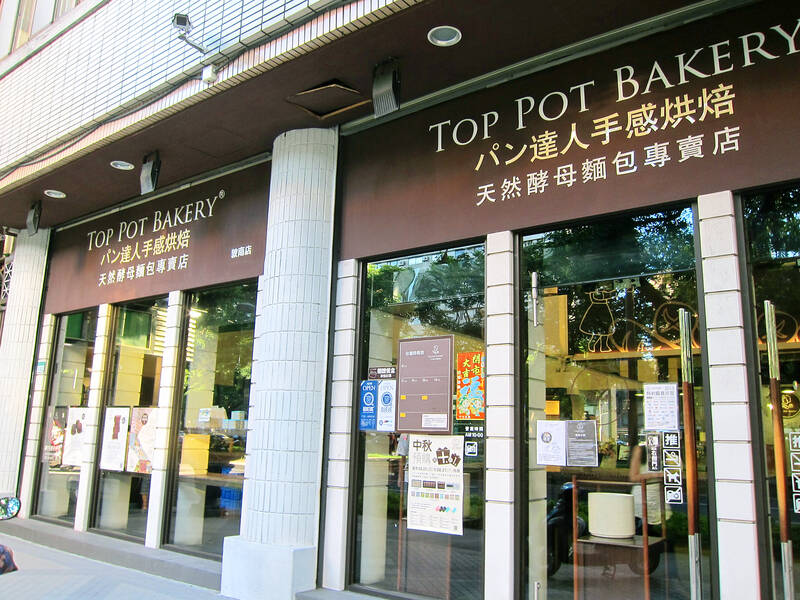A decade-long spat over a high-end bakery’s use of artificial ingredients in “all-natural” bread has ended with the Supreme Court awarding NT$3.42 million (US$111,473) in compensation to dissatisified customers.
The Consumers’ Foundation in a statement on Thursday said that Top Pot Bakery lost its appeal against a lower court ruling ordering it to pay 864 customers purchase-based compensation plus damages of NT$1,000 each.
The case began in August 2013 when a baker at Top Pot Bakery — which claimed its products were free of artificial ingredients — confessed to a Hong Kong blogger that the chain did indeed use such additives.

Photo: Chang Chuan-chia, Taipei Times
The bakery chain, which was established in late 2010, offered refunds or replacements following the revelation, but many customers were unwilling to accept the offer.
The Consumers’ Foundation in April 2014 filed a lawsuit with the Taipei District Court against former Top Pot Bakery chairman Chuang Hung-ming (莊鴻銘), then-chairman Hsu Hsun-ping (徐洵平) and entertainer Little S (小S, also known as Dee Hsu, 徐熙娣), asking for NT$25.6 million in compensation on behalf of 1,060 customers.
The consumer watchdog initially asked for the repayment of the original funds spent, plus three times that amount in punitive penalties and an additional NT$20,000 per person in psychological damage.
The Consumers’ Foundation said it listed Little S as a defendant because she had used her celebrity status to promote Top Pot’s products and should be held responsible for misleading the public.
The Taipei District Court in 2020 ruled that the firm, Chuang and Hsu Hsun-ping should jointly compensate 897 customers a total of NT$5.382 million.
However, the district court ruled that Little S was not liable for Top Pot’s false claims, as she had only said that the bakery’s products were “delicious” at a promotional event.
After an appeal, the High Court modified the lower court’s decision last year and ordered the company, Chuang and Hsu Hsun-ping to pay NT$3.42 million in compensation to 864 customers.
The High Court said the ruling, upheld by the Supreme Court, was made with consideration that Top Pot had already paid more than NT$100 million in out-of-court settlements.

Taiwan is stepping up plans to create self-sufficient supply chains for combat drones and increase foreign orders from the US to counter China’s numerical superiority, a defense official said on Saturday. Commenting on condition of anonymity, the official said the nation’s armed forces are in agreement with US Admiral Samuel Paparo’s assessment that Taiwan’s military must be prepared to turn the nation’s waters into a “hellscape” for the Chinese People’s Liberation Army (PLA). Paparo, the commander of the US Indo-Pacific Command, reiterated the concept during a Congressional hearing in Washington on Wednesday. He first coined the term in a security conference last

Prosecutors today declined to say who was questioned regarding alleged forgery on petitions to recall Democratic Progressive Party (DPP) legislators, after Chinese-language media earlier reported that members of the Chinese Nationalist Party (KMT) Youth League were brought in for questioning. The Ministry of Justice Investigation Bureau confirmed that two people had been questioned, but did not disclose any further information about the ongoing investigation. KMT Youth League members Lee Hsiao-liang (李孝亮) and Liu Szu-yin (劉思吟) — who are leading the effort to recall DPP caucus chief executive Rosalia Wu (吳思瑤) and Legislator Wu Pei-yi (吳沛憶) — both posted on Facebook saying: “I

A court has approved Kaohsiung prosecutors’ request that two people working for Democratic Progressive Party (DPP) Legislator Lin Dai-hua (林岱樺) be detained, as a probe into two cases allegedly involving her continues. The request was made on Friday, after prosecutors raided Lin’s two offices and the staffers’ residences, and questioned five on suspicion of contravening the Anti-Corruption Act (貪汙治罪條例). The people included the directors of Lin’s Daliao (大寮) and Linyuan (林園) district offices in Kaohsiung, surnamed Chou (周) and Lin (林) respectively, as well as three other staffers. The prosecutors’ move came after they interrogated Lin Dai-hua on Wednesday. She appeared solemn following

Sung Chien-liang (宋建樑), who led efforts to recall Democratic Progressive Party (DPP) Legislator Lee Kun-cheng (李坤城), was released on bail of NT$80,000 today amid outcry over his decision to wear a Nazi armband to questioning the night before. Sung arrived at the New Taipei District Prosecutors’ Office for questioning in a recall petition forgery case last night wearing a red armband bearing a swastika, carrying a copy of Adolf Hitler’s Mein Kampf and giving a Nazi salute. Sung left the building at 1:15am without the armband and covering the book with his coat. Lee said today that this is a serious